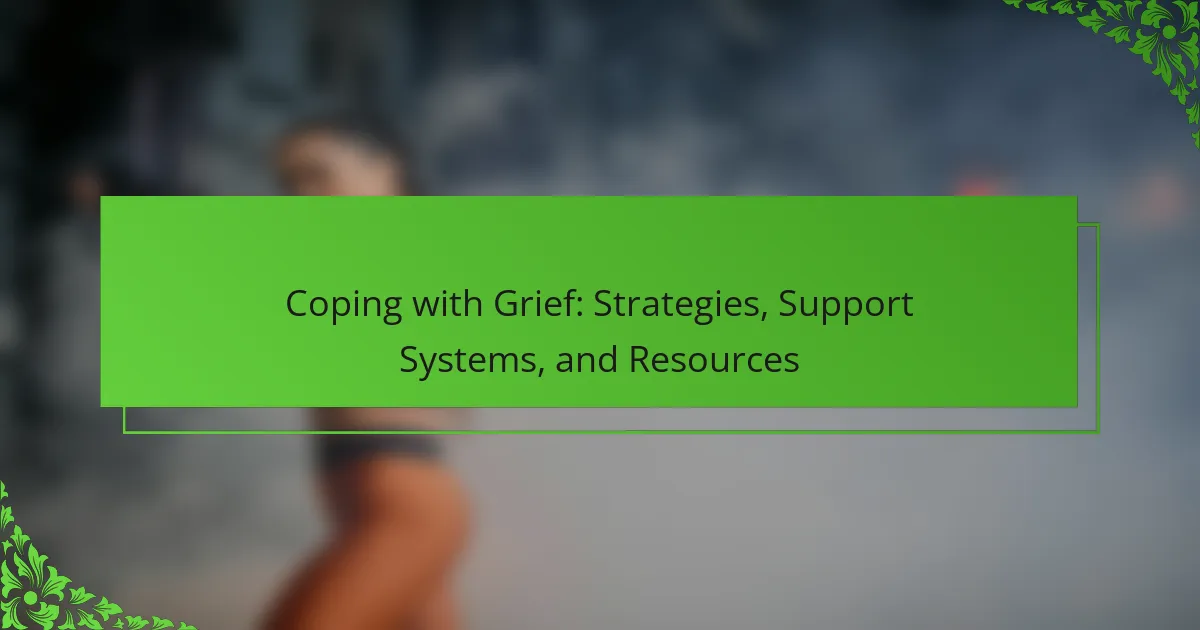Coping with grief can be a challenging journey filled with a range of emotions. Understanding common emotional responses is essential for effective coping. Establishing strong support systems and utilizing various strategies can aid in the healing process. Additionally, accessing tailored resources can provide further assistance during this difficult time.
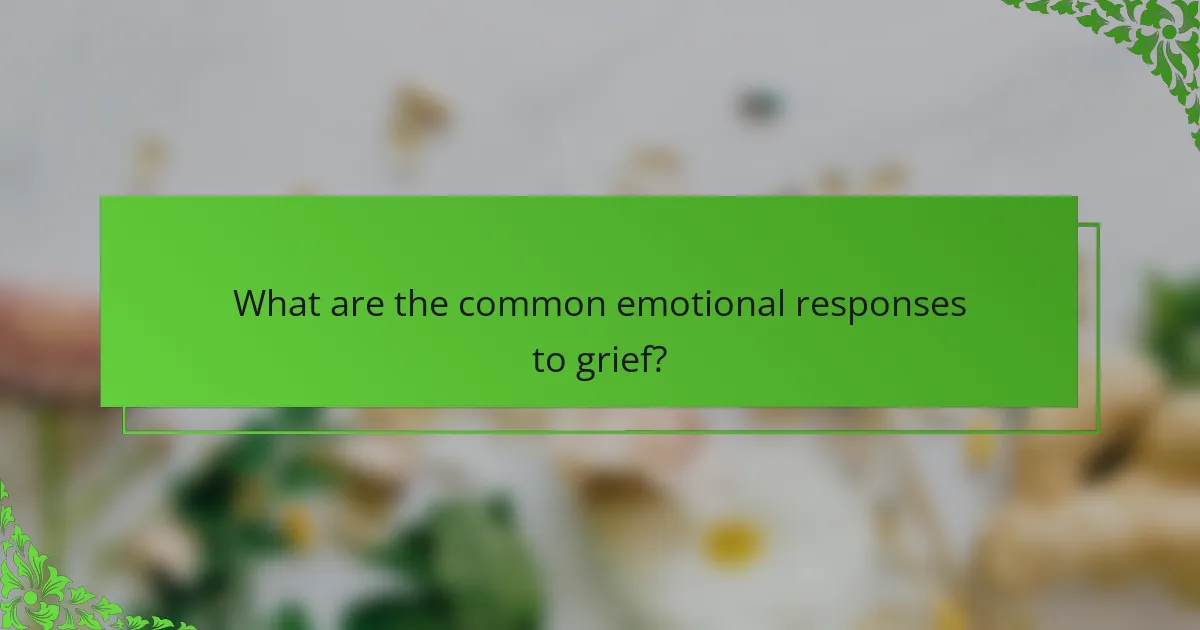
What are the common emotional responses to grief?
Common emotional responses to grief include sadness, anger, guilt, and confusion. These feelings can fluctuate and may manifest differently in individuals. Understanding these responses is crucial for coping effectively. Emotional responses often stem from the loss of a loved one and can be influenced by the relationship shared. Support systems, such as friends, family, and professional counseling, can provide essential guidance during this challenging time.
How does grief differ across cultures?
Grief varies significantly across cultures in expression, rituals, and support systems. In some cultures, grief is openly shared and communal, while in others, it may be more private and subdued.
For instance, in many Western cultures, individuals often seek therapy and professional support. In contrast, collectivist cultures may emphasize family and community involvement in the grieving process. Rituals, such as mourning periods or specific ceremonies, also differ widely.
Understanding these cultural differences can enhance empathy and support for those experiencing grief. Recognizing the unique attributes of each culture’s approach to grief fosters a more inclusive and compassionate response.
Why is understanding grief important for coping?
Understanding grief is crucial for effective coping because it helps individuals process their emotions and navigate their healing journey. Grief can manifest in various ways, affecting mental and physical health. Recognizing these patterns fosters self-awareness and encourages seeking support. For example, understanding that grief is not linear allows individuals to embrace their feelings without judgment. This insight can lead to healthier coping strategies, such as engaging in support groups or utilizing mental health resources. Ultimately, understanding grief empowers individuals to manage their experiences and find solace in shared connections.
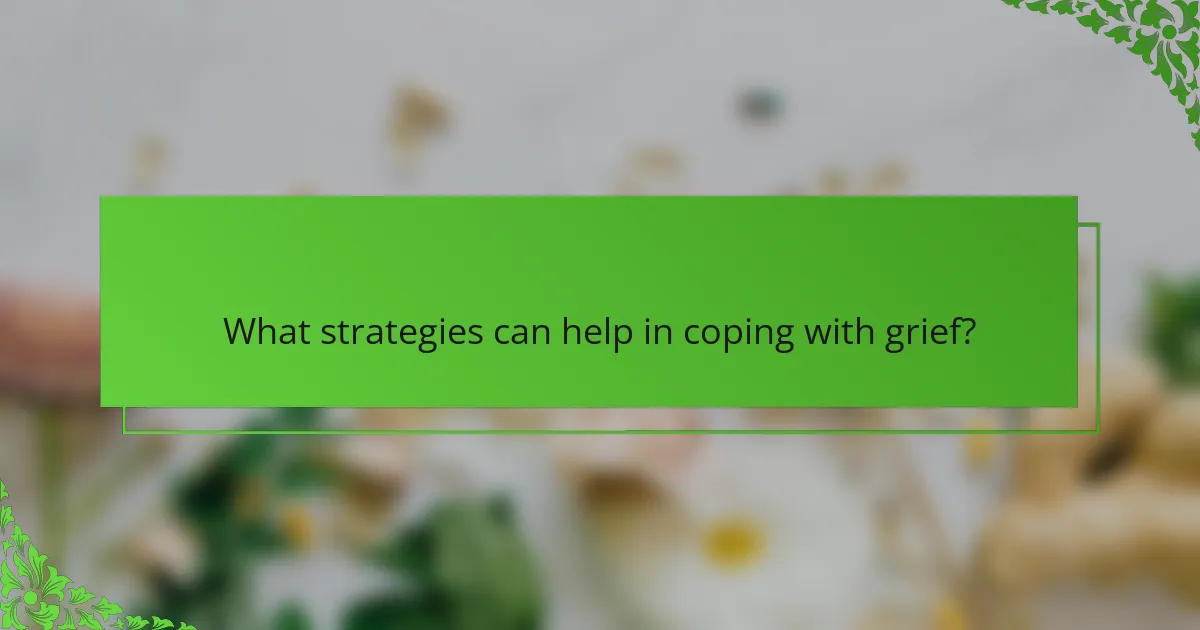
What strategies can help in coping with grief?
Coping with grief can be managed through several effective strategies. Establishing a support system is crucial; this can include friends, family, or support groups. Engaging in regular physical activity can enhance emotional well-being. Practicing mindfulness and meditation helps process emotions. Creative outlets like journaling or art can provide relief. Seeking professional help, such as therapy, offers tailored guidance. Lastly, allowing oneself to feel and express grief is essential for healing.
Which coping mechanisms are most effective?
Effective coping mechanisms for grief include seeking support, practicing self-care, and establishing routines. Support systems like friends, family, or support groups provide emotional connection. Self-care activities such as exercise, journaling, and mindfulness enhance well-being. Establishing daily routines offers stability during turbulent times.
How can mindfulness practices aid in grief recovery?
Mindfulness practices significantly aid in grief recovery by fostering emotional awareness and acceptance. These techniques encourage individuals to stay present, reducing overwhelming feelings associated with loss. Mindfulness can enhance coping strategies, improve mental clarity, and promote emotional resilience. Research indicates that regular mindfulness practice can lead to decreased symptoms of anxiety and depression, which often accompany grief. Incorporating mindfulness into daily routines, such as through meditation or mindful breathing, can create a supportive environment for healing.
What role does journaling play in processing grief?
Journaling plays a significant role in processing grief by providing an outlet for emotions and thoughts. It allows individuals to articulate their feelings, reflect on memories, and track their healing journey. Writing can enhance self-awareness and facilitate emotional release, which is crucial during grieving. Research shows that expressive writing can reduce symptoms of depression and anxiety, helping individuals cope more effectively. Regular journaling fosters a deeper understanding of one’s grief, creating a unique narrative that can aid in moving forward.
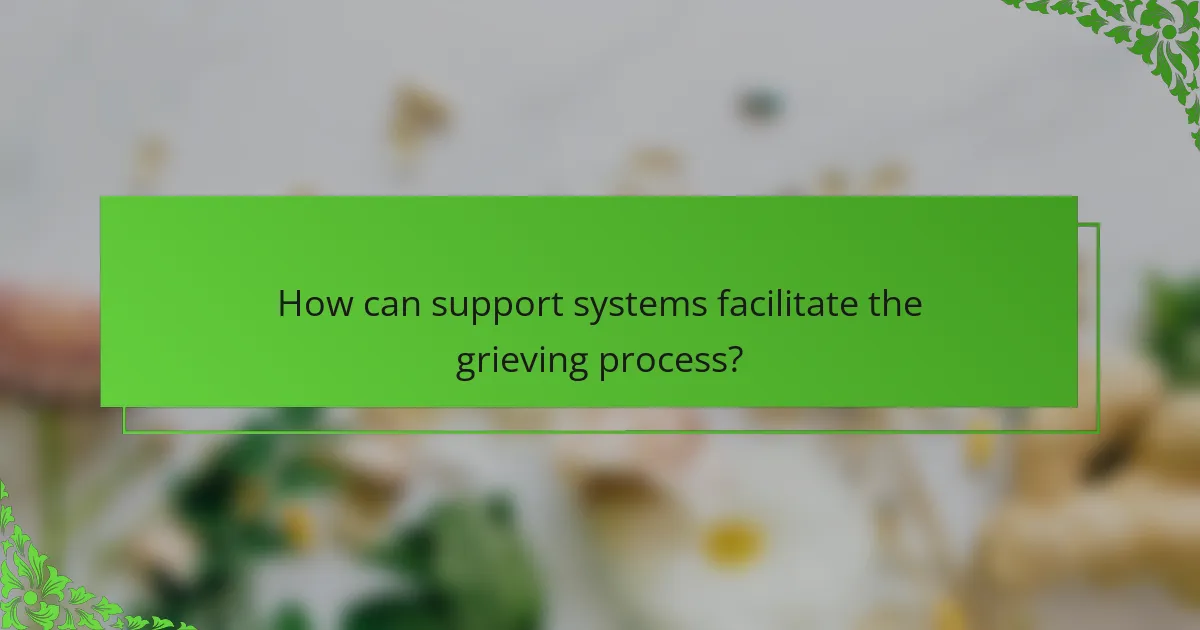
How can support systems facilitate the grieving process?
Support systems significantly ease the grieving process by providing emotional, social, and practical assistance. They foster connection, reduce isolation, and offer a safe space for expressing feelings. Support groups and therapy can enhance coping mechanisms, allowing individuals to share experiences and learn from others. Engaging with friends and family can also provide comfort and understanding, facilitating healing. Overall, a strong support network promotes resilience during difficult times.
What types of support groups are available?
Support groups for coping with grief include peer-led, professionally facilitated, online, and specialized groups. Each type offers unique benefits for emotional support and shared experiences.
Peer-led groups provide a safe space for individuals to share personal stories and feelings. Professionally facilitated groups often include guidance from therapists to help navigate complex emotions. Online support groups offer flexibility and accessibility, allowing participants to connect from anywhere. Specialized groups focus on specific types of loss, such as loss of a child or spouse, providing tailored support for unique grief experiences.
How can family and friends provide effective support?
Family and friends can provide effective support by actively listening, offering practical help, and being present. They should validate feelings and encourage open communication. Consistent check-ins and shared memories can foster connection. Engaging in comforting activities together can also ease the grieving process.
Which professional resources are recommended for grief counseling?
Grief counseling can benefit from various professional resources. Recommended resources include licensed therapists specializing in grief, support groups, online forums, and educational materials focused on coping strategies. These resources provide emotional support and practical tools for navigating grief.
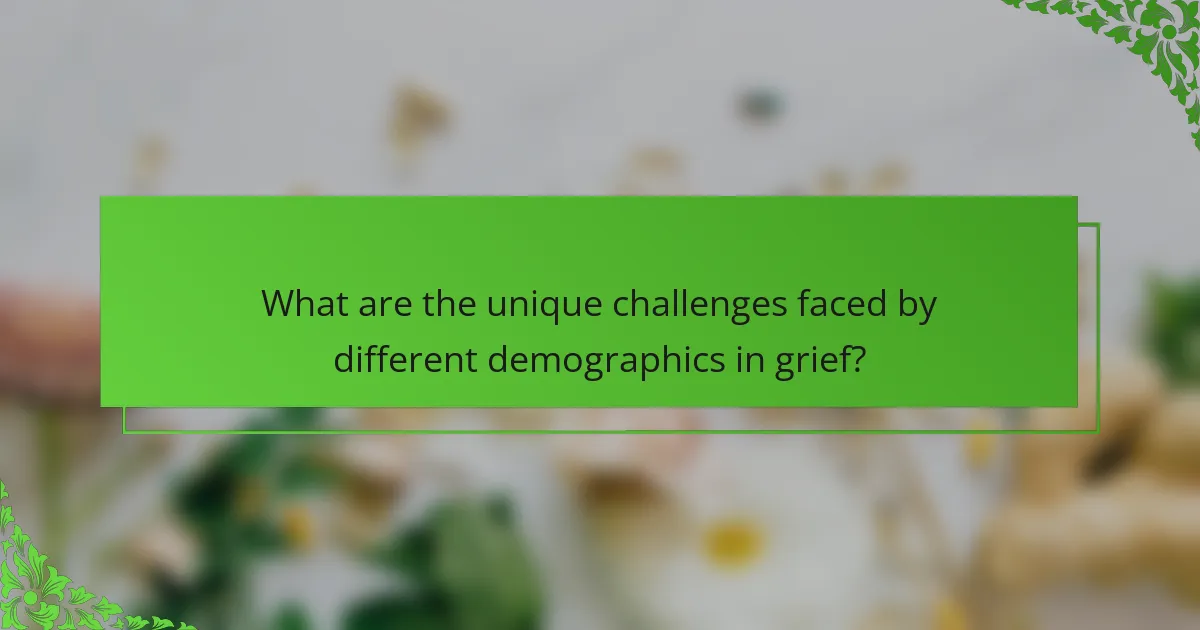
What are the unique challenges faced by different demographics in grief?
Different demographics face unique challenges in grief due to varying cultural, social, and economic factors. For instance, children may struggle to articulate emotions, while older adults might confront isolation.
Cultural background significantly influences grief expression. Some cultures encourage open mourning, while others promote stoicism. Economic status may limit access to mental health resources, exacerbating feelings of loss.
Support systems also differ; single parents often lack adequate social support, whereas community-oriented groups may provide solace for those in collectivist cultures.
Understanding these diverse challenges helps tailor coping strategies and resources to meet specific demographic needs effectively.
How do children experience and cope with grief?
Children experience grief through emotional responses such as sadness, confusion, and anger. They cope with grief by using strategies like talking to trusted adults, engaging in creative expression, and participating in support groups.
Support systems play a crucial role in helping children navigate their grief. Parents, teachers, and counselors can provide a safe space for children to express their feelings. Resources such as books and therapy can also aid in their understanding of loss.
Unique attributes of children’s grief include their developmental stage, which influences how they perceive and process loss. Younger children may struggle to understand the permanence of death, while older children might grapple with complex emotions.
Research indicates that open communication and validation of feelings significantly enhance a child’s ability to cope. Encouraging children to share memories of the deceased can foster healing and connection.
What are the specific needs of grieving parents?
Grieving parents require emotional support, practical assistance, and understanding from their community. They often seek safe spaces to express their feelings and connect with others who have experienced similar losses.
Support systems, such as grief counseling and support groups, can provide crucial outlets for sharing experiences. Additionally, practical help, like meal preparation or childcare, can alleviate some burdens during this challenging time.
Resources that offer information on coping strategies, memorial options, and self-care techniques are essential. Each parent’s journey is unique, and recognizing their individual needs fosters healing and resilience.
How does grief manifest in older adults?
Grief in older adults often manifests through emotional, physical, and behavioral changes. Common emotional responses include sadness, anger, and anxiety. Physically, symptoms may involve fatigue, changes in appetite, and sleep disturbances. Behaviorally, older adults might withdraw from social interactions or lose interest in activities.
Support systems play a crucial role in coping with grief. Family, friends, and community resources can provide essential emotional support. Engaging in support groups can also help older adults share experiences and find solace in shared understanding.
Healthy coping strategies are vital. Activities like journaling, exercising, or pursuing hobbies can offer outlets for grief. Professional counseling may also provide tailored strategies to manage grief effectively.
Understanding these manifestations aids caregivers and loved ones in offering appropriate support. Recognizing signs of grief can lead to timely interventions, enhancing the well-being of older adults experiencing loss.
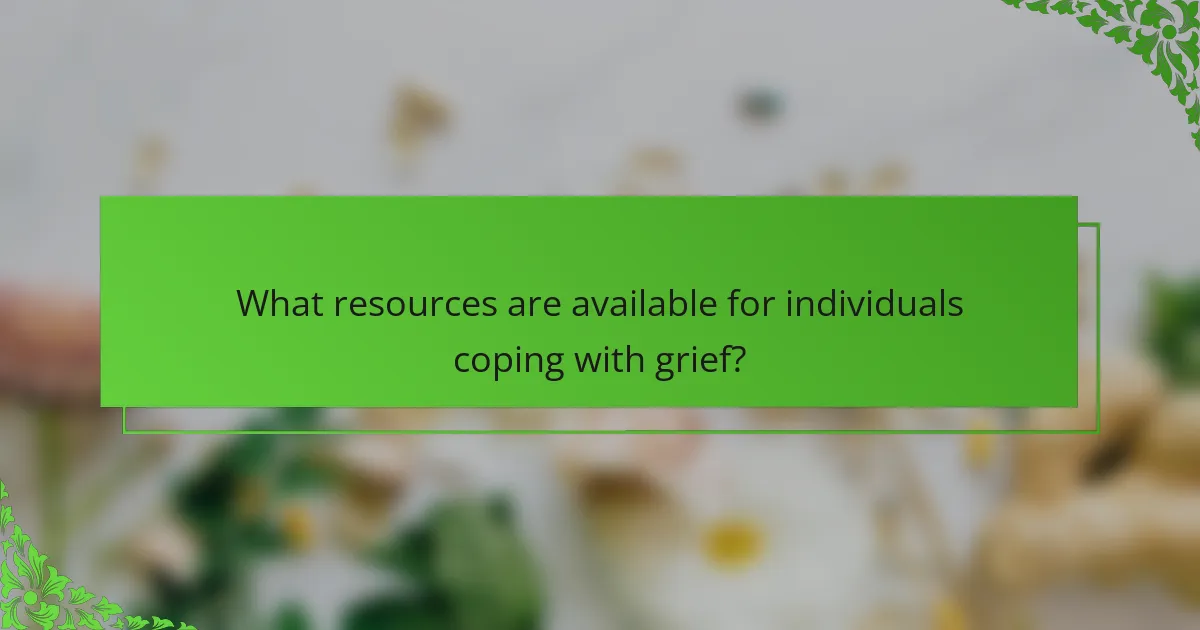
What resources are available for individuals coping with grief?
Individuals coping with grief can access various resources, including support groups, counseling services, and online platforms. Support groups provide community and shared experiences, while counseling offers professional guidance. Online resources include articles, forums, and helplines. Local organizations often host workshops and events focused on grief management. Additionally, self-help books and mobile applications can provide coping strategies and emotional support.
Which online platforms offer grief support?
Numerous online platforms offer grief support, including dedicated websites, forums, and social media groups. Notable options are GriefShare, which provides resources and local support groups, and The Compassionate Friends, focusing on peer support for bereaved families. Other platforms include online therapy services like BetterHelp and Talkspace, which connect individuals with licensed therapists specializing in grief counseling. Additionally, Facebook groups can serve as informal support networks, allowing individuals to share experiences and coping strategies.
What books are highly recommended for understanding grief?
Books highly recommended for understanding grief include “The Year of Magical Thinking” by Joan Didion, “On Grief and Grieving” by Elisabeth Kübler-Ross, and “Being Mortal” by Atul Gawande. These works explore personal experiences, emotional processes, and practical insights into coping with loss. Each book offers unique perspectives that can aid individuals in navigating their grief journey.
How can community organizations assist in grief support?
Community organizations can provide essential grief support through various services. They offer counseling sessions, support groups, and workshops that facilitate emotional expression. These organizations often connect individuals with trained professionals who understand grief’s complexities. Additionally, they create safe spaces for sharing experiences, which fosters community bonding and healing. Some organizations may also provide resources like educational materials or referral services to further assist those coping with loss.
What are the best practices for helping someone who is grieving?
To help someone who is grieving, provide emotional support, listen actively, and encourage them to express their feelings. Offer practical assistance, such as helping with daily tasks or making meals. Suggest professional help if needed and be patient, as grief has no set timeline. Regular check-ins can help them feel less isolated.
